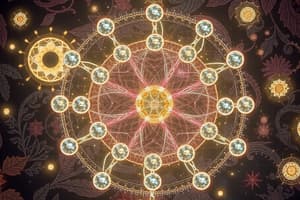Podcast
Questions and Answers
What was the name of the scientist who laid the foundation of chemical sciences by establishing two important laws of chemical combination?
What was the name of the scientist who laid the foundation of chemical sciences by establishing two important laws of chemical combination?
- Lavoisier (correct)
- Proust
- Dalton
- None of the above
What does the law of conservation of mass state?
What does the law of conservation of mass state?
- Mass can be created in a chemical reaction.
- Mass can be destroyed in a chemical reaction.
- Mass can neither be created nor destroyed in a chemical reaction. (correct)
- None of the above
Which law states that many compounds were composed of two or more elements and each compound had the same elements in the same proportions?
Which law states that many compounds were composed of two or more elements and each compound had the same elements in the same proportions?
- Law of Conservation of Mass
- Law of Constant Proportions (correct)
- Law of Definite Proportions
- None of the above
Who provided the basic theory about the nature of matter?
Who provided the basic theory about the nature of matter?
What did Dalton pick up as the name for the basic units of matter?
What did Dalton pick up as the name for the basic units of matter?
Who was the Indian philosopher that postulated the concept of Parmanu?
Who was the Indian philosopher that postulated the concept of Parmanu?
What did Democritus name the indivisible particles?
What did Democritus name the indivisible particles?
When did ancient Indian philosophers consider the divisibility of matter?
When did ancient Indian philosophers consider the divisibility of matter?
What did Antoine L. recognize by the end of the eighteenth century?
What did Antoine L. recognize by the end of the eighteenth century?
Who suggested that if matter is divided, a stage will come when particles obtained cannot be divided further?
Who suggested that if matter is divided, a stage will come when particles obtained cannot be divided further?
Flashcards are hidden until you start studying
Study Notes
Foundations of Chemical Sciences
- The scientist who laid the foundation of chemical sciences by establishing two important laws of chemical combination is unknown from the given text.
Laws of Chemical Combination
- The law of conservation of mass states that matter cannot be created or destroyed in a chemical reaction.
- The law that states many compounds were composed of two or more elements and each compound had the same elements in the same proportions is the law of definite proportions.
Atomic Theory
- The Indian philosopher who postulated the concept of Parmanu (atoms) is unknown from the given text.
- Democritus named the indivisible particles as atoms.
- Ancient Indian philosophers considered the divisibility of matter.
- Dalton picked up the name "atoms" for the basic units of matter.
Development of Atomic Theory
- By the end of the eighteenth century, Antoine Lavoisier recognized that matter cannot be created or destroyed in a chemical reaction.
- It was suggested that if matter is divided, a stage will come when particles obtained cannot be divided further.
Studying That Suits You
Use AI to generate personalized quizzes and flashcards to suit your learning preferences.




